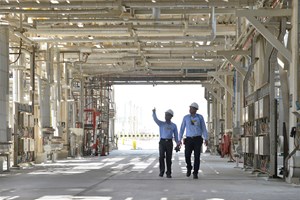Oil price settles near $70 as traders shrug off Saudi terminal attack
SINGAPORE (Bloomberg) - Brent oil erased gains as the market shrugged off an attack on the world’s largest crude terminal in Saudi Arabia.
Futures in London earlier surged above $71 a barrel, the highest since January 2020, before retreating to trade little changed. The assault on a storage tank farm at Ras Tanura on Sunday was intercepted, Saudi Arabia said, and oil output appeared to be unaffected.
Oil has rebounded this year amid OPEC+ supply cuts and recovering demand, with economies emerging from the coronavirus crisis. The rally quickened last week after the producer alliance made a surprise pledge to keep output steady in April, prompting a raft of investment banks to raise their price forecasts.
“Even though today’s risk premium will soon fade again, the economic recovery, vaccination progress, and petro-nation supply curbs point at even higher prices in the near term,” said Norbert Ruecker, an economist at Julius Baer.
There was a mixed picture for crude in broader markets. U.S. President Joe Biden is on the cusp of his first legislative win, with the House ready to pass his $1.9 trillion Covid-19 relief plan. But the dollar also climbed, reducing the appeal of commodities priced in the currency, while U.S. equity futures deepened losses.
Prices:
- Brent for May settlement traded down 0.3% at $69.18 a barrel as of 10:16 a.m. London time, after climbing as high as $71.38 earlier
- West Texas Intermediate for April delivery also slipped 0.3% to trade at $65.92
- WTI earlier hit its highest intraday level since October 2018
Monday’s earlier Brent rally north of $70 may cause a headache for Asian refiners, which are warning that the rapid surge and spike in volatility will hurt demand and whittle away still-tight processing margins. Saudi Arabia has also boosted its official selling prices to buyers in the region for April.
Mideast Tensions
Saudi Arabia said the Ras Tanura site on the country’s Gulf coast was targeted by a drone from the sea. The terminal is capable of exporting about 6.5 million barrels a day -- almost 7% of demand -- and, as such, is one of the world’s most protected facilities. It’s the most serious attack on Saudi oil installations since a key processing facility and two oil fields came under fire in September 2019.
The assault follows a recent escalation of hostilities in the Middle East region after Yemen’s Houthi rebels launched a series of attacks on Saudi Arabia. The new U.S. administration also carried out airstrikes in Syria last month on sites it said were connected with Iran-backed groups.
Other oil-market news:
- A flood of fuel exports from Asian suppliers is driving an unusual post-Lunar New Year surge in shipping activity, boosting tanker rates on one key route in the region from the lowest level in almost nine years.
- The new Libyan unity government will restore an oil and gas portfolio as one of 27 ministries to administer the war-ravaged OPEC member until December elections, according to the office of the prime minister-designate.
Click here to subscribe to the World Oil energy newsletter, and receive exclusive industry news and analysis in your inbox each weekday.



